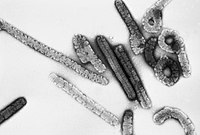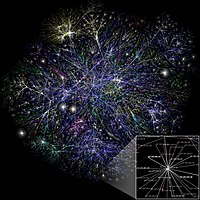
Early-life behavioral features are associated with chronic emesis in rhesus macaques (Macaca mulatta)
Sign Up to like & getrecommendations! Published in 2023 at "American journal of primatology"
DOI: 10.1002/ajp.23488
Abstract: Chronic emesis (CE) is a poorly understood condition in human and nonhuman primates that negatively impacts the quality of life. Early identification of risk factors for the development of CE is likely to improve the… read more here.
Keywords: chronic emesis; macaca mulatta; early life; macaques macaca ... See more keywords

Heritability of social behavioral phenotypes and preliminary associations with autism spectrum disorder risk genes in rhesus macaques: A whole exome sequencing study
Sign Up to like & getrecommendations! Published in 2022 at "Autism Research"
DOI: 10.1002/aur.2675
Abstract: Nonhuman primates and especially rhesus macaques (Macaca mulatta) have been indispensable animal models for studies of various aspects of neurobiology, developmental psychology, and other aspects of neuroscience. While remarkable progress has been made in our… read more here.
Keywords: heritability; autism; social behavior; rhesus macaques ... See more keywords

Impacts of early social experience on cognitive development in infant rhesus macaques.
Sign Up to like & getrecommendations! Published in 2019 at "Developmental psychobiology"
DOI: 10.1002/dev.21916
Abstract: Although much is known about the influences of early life experiences on the neurobiology and behavior of macaque models of child development, there is scant literature on cognitive development with respect to early rearing. Here,… read more here.
Keywords: early social; development infant; rhesus macaques; cognitive development ... See more keywords

Marburg virus‐like particles produced in insect cells induce neutralizing antibodies in rhesus macaques
Sign Up to like & getrecommendations! Published in 2017 at "Journal of Medical Virology"
DOI: 10.1002/jmv.24832
Abstract: Marburg virus (MARV), which is one of the most virulent agents in the world, causes lethal haemorrhagic fever in humans and nonhuman primates (NHPs) with a mortality rate of up to 90%. Currently, there is… read more here.
Keywords: marburg virus; marv; virus like; rhesus macaques ... See more keywords

Polymorphisms in the APOBEC3G gene of Chinese rhesus macaques affect resistance to ubiquitination and degradation mediated by HIV-2 Vif
Sign Up to like & getrecommendations! Published in 2019 at "Archives of Virology"
DOI: 10.1007/s00705-019-04194-0
Abstract: Animal cells have multiple innate effector mechanisms that inhibit viral replication. For the pathogenic retrovirus human immunodeficiency virus 1 (HIV-1), there are widely expressed restriction factors, such as APOBEC3 proteins, tetherin/BST2, SAMHD1 and MX2, as… read more here.
Keywords: degradation; hiv; vif; rhesus macaques ... See more keywords

The Hand That Feeds the Monkey: Mutual Influence of Humans and Rhesus Macaques (Macaca mulatta) in the Context of Provisioning
Sign Up to like & getrecommendations! Published in 2018 at "International Journal of Primatology"
DOI: 10.1007/s10764-018-0014-1
Abstract: Historically, humans and other primates (primates henceforth) have coexisted across cultures and contexts, and many primate populations use anthropogenic food sources as their main or supplementary food. While primates may actively forage for such food,… read more here.
Keywords: monkey mutual; hand feeds; feeds monkey; rhesus macaques ... See more keywords

Effects of estradiol supplementation on the brain transcriptome of old rhesus macaques maintained on an obesogenic diet.
Sign Up to like & getrecommendations! Published in 2021 at "GeroScience"
DOI: 10.1007/s11357-021-00453-8
Abstract: Obesity, the cessation of ovarian steroids with menopause, and age are risk factors for mood disorders, dementia, and Alzheimer's disease (AD). However, immediate hormone therapy (HT) after menopause may have beneficial effects in different brain… read more here.
Keywords: effects estradiol; rhesus macaques; obesogenic diet; brain ... See more keywords

The levels of DNGR-1 and its ligand-bearing cells were altered after human and simian immunodeficiency virus infection
Sign Up to like & getrecommendations! Published in 2017 at "Immunologic Research"
DOI: 10.1007/s12026-017-8925-z
Abstract: Dendritic cell NK lectin Group Receptor-1 (DNGR-1), also known as C-type lectin domain family 9, member A (CLEC9A), is a member of C-type lectin receptor superfamily expressed primarily on dendritic cells (DC) that excel in… read more here.
Keywords: simian immunodeficiency; rhesus macaques; immunodeficiency; immunodeficiency virus ... See more keywords

Affiliation and disease risk: social networks mediate gut microbial transmission among rhesus macaques
Sign Up to like & getrecommendations! Published in 2019 at "Animal Behaviour"
DOI: 10.1016/j.anbehav.2019.03.009
Abstract: In social animals, affiliative behaviours bring many benefits, but also costs such as disease risk. The ways in which affiliation may affect the risk of infectious agent transmission remain unclear. Moreover, studies linking variation in… read more here.
Keywords: risk; transmission; social networks; rhesus macaques ... See more keywords

High rates of aggression do not predict rates of trauma in captive groups of macaques.
Sign Up to like & getrecommendations! Published in 2019 at "Applied animal behaviour science"
DOI: 10.1016/j.applanim.2019.01.003
Abstract: Socially inflicted traumas are a major concern for the management of captive groups of rhesus macaques. Rhesus macaques are the most commonly used nonhuman primate in biomedical research, and social housing is optimal for promoting… read more here.
Keywords: rates aggression; trauma; captive groups; rates trauma ... See more keywords

Happiness, welfare, and personality in rhesus macaques (Macaca mulatta)
Sign Up to like & getrecommendations! Published in 2021 at "Applied Animal Behaviour Science"
DOI: 10.1016/j.applanim.2021.105268
Abstract: Abstract When we treat an animal’s welfare as an individual experience, we should consider the possibility that it may be associated with individual differences in personality. We tested for such associations in 44 socially housed… read more here.
Keywords: welfare; macaca mulatta; macaques macaca; rhesus macaques ... See more keywords